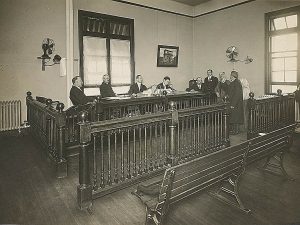D.W Lewis & Ors v Bankole & Ors (1909): Family land can be said to be land which is owned and held by family as a unit. One individual member of the family cannot claim ownership of the family land. An individual member of family cannot alienate or transfer the family land, this is because tittle to any land held by family is owned by the family as a corporate unit. Only the family has the right to transfer land title to anyone. Any attempt by an individual member of family to transfer or Alienate family land is void. The only time a right of Alienation will arise is where there has been partition of the said family land.
A family head can be said to be a member of family who has been tasked with the management of the said family’s property on behalf of the other family members. The head is said to be the trustee of the family property, he is also the main representative of the family at any official function. The head is the voice through which the whole family speaks.
The court of law is meant to take notice of any customary law which the litigatants have alleged to be applicable in their community. The courts however ought to ensure that the said customary law sought to be applied by it are not in any way repugnant to equity, good conscience and natural law. The customs must also still be in existence at the time when the litigatants sought for it to be applied, if it is no longer recognized by the community as good law, the court is to ignore such law.

Customary law must not be inconsistent with the constitution of the federal republic of Nigeria 1999, the constitution being the grund norm of the country is Supreme over any other law. The customs must not also be against public policy in anyway. All these principles were made evident in the case of D.W Lewis v Bankole.
Recommended: Case summary of Edet v Essen (1932)
Issue raised in D.W Lewis & Ors v. Bankole & Ors (1909)
a. The main issue in the question was whether the land held by the defendants could be classified as family land?

Also see: How to become a successful Lawyer
Facts summary of D.W Lewis v Bankole
The facts of the case were as follows, that one chief mabinuori died in 1874, at the time of his death, he had 12 children, his eldest child was a woman. Chief mabinuori was a very weathly man who had a lot of properties, he had three pieces of land, one of which was a family compound where he lived with his family and some of his domestic servants. On the second land he built a house for his eldest daughter and two of his sons, the third land was designated for the worship of the family fetish gods.
In 1905, an action was brought by certain Mabinuori grandchildren, most of them issues of the children of mabinuori who separate houses had been built for against the remaining occupants of the family compound built by mabinuori. These included the daughters of the deceased mabinuori and children of a deceased younger son. The plaintiff prayed the court to declare that they the plaintiffs being defendants of mabinuori were entitled to the family property/land just like the descendants were. They also wanted a declaration that the compound in question was family property.

At court, the judge enquired as to whether the plaintiff had at any point received any amount of money which would have disentilled them from claiming ownership of the property. The court stated that in deciding the case it would need to consider the native laws and customs prevelant in the community as well as how it related to family to land. The court went further to state that the case arising in the southern part of Nigeria, the action ought to be tried in accordance with British law. British law being the doctrine of equity, common law principles and statue of general applications applicable in Nigeria at the 1st of Jan, 1900. The main reason for the application of British law was that Nigeria at the time was a British colony.
Also see: Best Law Apps for Lawyers and Law Students
Section 18 of the said law had stated that common law and equity was applicable in southern Nigeria but when there was any conflict what so ever between the doctrines of equity and principle of common law then the principles of common law ought to prevail. S19 also enabled the courts to take notice of any custom or tradition which was applicable in the said community, however for such custom or traditional to be applicable they must not be repugnant to equity, good conscience and natural law. The customary law could be applied to case relating to the real estate properties.
The court further stated that the customary law which is sought to be applied must be a customary law which was still in existence at the time when it is sought to be applied and not any law of a bygone Era.
The court while delivering its judgment acknowledged that the concept of family ownership of land was slowly becoming a thing of the past and that more progressive systems ownership were starting to replace the system of ownership, however it appreciated the hardship that would be thrust on litigatants if the the family system of ownership were all of a sudden completely abolished.
The court acknowledged that the defendants had been in possession of the said land for many years but it was known to them that they occupied the said land as members of the mabinuori family. The court stated that the defendants could not exercise their rights in a way that was adverse to the interests of the other members of the mabinuori family. The plaintiff were held to have joint interests in the land.
The court stated that though the defendants had a right to still occupy the land in question, they could not alienate the land without the consent of the chief member of the family. The court finally ruled in favor of the plaintiff.

Recommended: Best Books On Financial Intelligence 2022: Top 10 Money Books
Decision of the court in Lewis v Bankole
When the plaintiff approached the court for its decision, the court acknowledged that the custom and tradition of the community may need to be considered by the court in its decision. The court held that the custom would only admitted by the court if it wasn’t repugnant to equity, good conscience and natural justice.
It also stated that the custom in question must still be in existence at the time it was sought to be applied.
The court held that although the defendants had been in possession of the land for many years, the still held the land as members of the family unit. As members of the family unit they could do any act that was adverse to the interests of other family members.
Recommended: Differences Between Passive Income and Active Income
The court stated that the defendants could not continuing being in occupation but they could not alienate without the permission of the family head and other members of the family. The court ruled in favor of the plaintiff.

Edeh Samuel Chukwuemeka, ACMC, is a lawyer and a certified mediator/conciliator in Nigeria. He is also a developer with knowledge in various programming languages. Samuel is determined to leverage his skills in technology, SEO, and legal practice to revolutionize the legal profession worldwide by creating web and mobile applications that simplify legal research. Sam is also passionate about educating and providing valuable information to people.
Thanks so much, but I don’t understand this case
i dont understand this case